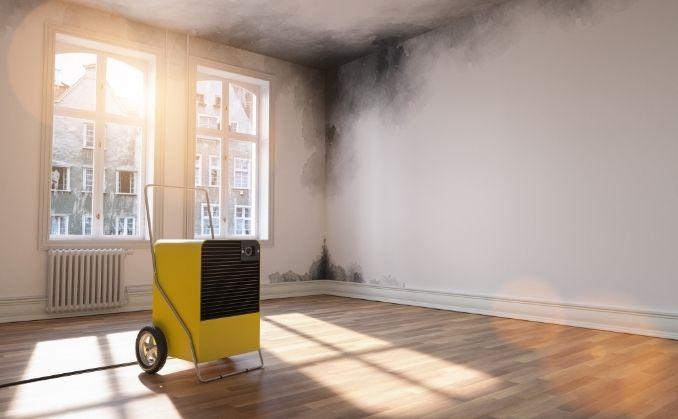Have you ever wondered why your walls are wet and damp? Especially in winter seasons. This is due, in large part, to the temperature difference between the outside air and the inside air that favors condensation and humidity on walls and windows.
But it is not only due to this phenomenon, far from it, it could also be due to leaking pipes, leaking roofs, inadequate insulation, etc… this encourages mold growth and stains on drywall. And moisture is not something we should take lightly, not only for the structure of the house, but also for the health of the people who live with her. There are times when damp becomes a problem and it is advisable to call specialists in damp removal (as our team of professionals in Javea), but other times we can prevent them from appearing with some tips.
But how can you prevent damp in the walls? Fortunately we have a series of tips and tricks to dry the walls and also to avoid major damage in the future.
How to prevent damp walls?
Preventing wet walls is not difficult if you know how to do it. In Bartolomé Bas we work daily with dampness problems and we know very well the procedure and the materials that should be used to have the perfect finish and that it will not happen again. But in the meantime, here are some tips.
First you should start by identifying the places where moisture is likely to accumulate and from here, follow these tips:
Ventilate the house properly to avoid dampness.
The most important thing, although it may seem silly, is to ventilate the home to keep it free of moisture. It seems also another nonsense, but human activity also favors the appearance of moisture, such as the simple fact of breathing, bathing, cooking, using the dryer, etc … All this water and steam that is formed must go somewhere, and if it has no exit to leave, it accumulates in the house. So, the first thing we advise you to do is to open and ventilate the kitchen and bathrooms more often.
There are ventilation mechanisms such as ventilators. Some even have humidity sensors. But to find out if you need one of these in your home, you can talk to our team of professional painters in Javea and surroundings and they will give you the best option
Improve insulation
A practical way to avoid excess humidity is to install double pane windows, with at least two layers of glass. This will considerably improve insulation and help reduce heat loss from your home. In older homes or apartments this is the main cause of damp. It is true that it is an important investment, so better first contact our team’s opinion.
SPECIALISTS IN ELIMINATION OF HUMIDITY
Installing exhaust fans
An exhaust fan is not something you would normally see in an ordinary home, but we have to tell you about it. Installing an exhaust fan in the bathroom and turning it on every time you shower or bathe will ensure dry air and prevent excessive moisture from building up on the walls.
Get a dehumidifier to prevent dampness.
A dehumidifier absorbs all the moisture in the room and prevents dampness and mold. There are portable dehumidifiers that can be moved from room to room. You can have it around 24 and 36 hours in each room whenever you need it.
There are small dehumidifiers that you can know in any room, even in closets, sheds, attics, etc….
Control mold growth
Many times, condensation and mold accumulate in particular parts of the house, such as behind large pieces of furniture, in corners of rooms, under windows, in window frames or inside closets. In this case we give you this advice: if you do find mold, remove it by wiping it off with a damp cloth or by using a mold spary. Diluted bleach also works very well for these cases.
And of course, if you are building a house from scratch or renovating your own, try to use the building material wisely, as there are many materials that retain moisture. For example, a brick wall is more likely to let moisture through. We also recommend concrete interiors, as plaster is worse for moisture seepage.
Other small tips would be:
- Minimize the amount of houseplants, as they release water vapor and generate humid air.
- Always air dry clothes.
- Invest in good downspout and gutter systems.
- Protect foundations with waterproof film
- Build waterproof concrete foundations of up to 100 cm (32 in.)
- For perimeter wall coverings, the addition of a moisture barrier is recommended
- Paints and wall materials are also very useful and effective in preventing dampness in the house.

